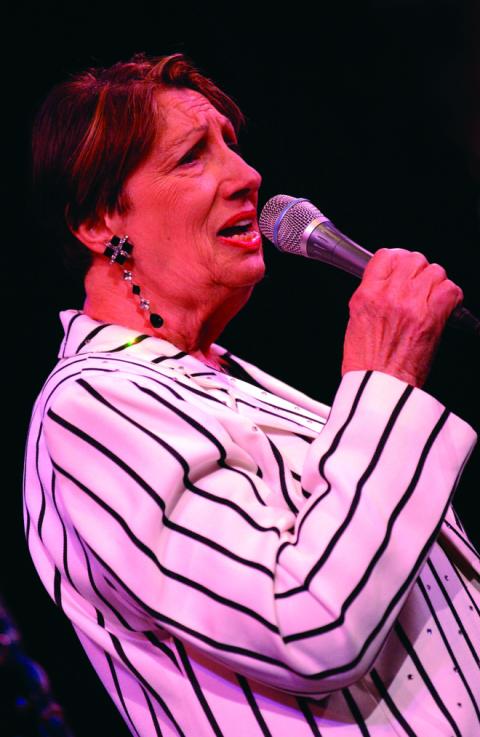Faculty Profile: Maggie Scott

Professor Maggie Scott
Phil Farnsworth
Dressed casually in jeans and a brown sweater for a morning class, Professor Maggie Scott might not look the part of a great jazz performer. But the students enrolled in her Great American Songbook course most definitely consider her to be one.
“You are moving around too much; it gets distracting,” Scott tells a young student wearing an iconic Rolling Stones lips-and-tongue logo T-shirt as she sings Gershwin to piano and bass accompaniment. “Just imagine you are in a great room with 5,000 people,” Scott advises. “Playing jazz?” pianist Barry Silverman asks incredulously.
“Well, years ago, that happened,” Scott responds. She reveres jazz standards, is a perfectionist when it comes to their vocal interpretation, and believes that the audience for jazz music should still be large.
A few days earlier, Scott hosted her annual student recital, “The Jazz Vocal Series,” at the David Friend Recital Hall. She handles all aspects of the series, from auditioning the eight students who will perform to playing the piano at the show. “I just feel someone has to keep the jazz vocalist going,” she says.
At Berklee, that someone is Scott. “Maggie knows her stuff,” says vocalist Robin McKelle, ’99, who, after a gig, called from Paris to voice appreciation for her former teacher, mentor, and “second mom.” “Maggie’s very passionate about jazz. She wants students to get it and to understand it.”
A veteran jazz vocalist and pianist, Scott has been performing for six decades and since 1978 has taught voice at Berklee. For years, she has played as a soloist and with her trio at Boston-area hotels and jazz clubs. She has accompanied greats such as Cab Calloway and Eartha Kitt, and mentored such rising talents as McKelle, Andrea Capozzoli ’01, Lalah Hathaway ’90, and Antonia Bennett ’95. She is also considered a trailblazer for female musicians. Her daughter, Robin Stone, an associate professor of guitar at Berklee, describes her as “a great role model—way ahead of her time.”
Scott is 82 years old but looks at least two decades younger and has the energy level and pizzazz reserved for the ageless few. Pressed to share her fountain-of-youth secret, she responds, “Good scotch. I have a drink before dinner, and my doctor says that’s fine.”
But those who know her contend that it’s the music she loves that keeps her vibrant and young at heart. “It’s always been jazz,” Scott says. “Always.”
Setting the Standard
Born Margaret Vazaian to Armenian immigrant parents, Scott grew up in the Boston area and took up jazz piano in junior high school before studying piano for a semester at Juilliard. She describes being the featured piano soloist in Gershwin’s Concerto in F with Arthur Fielder and the Boston Pops Orchestra at Symphony Hall in 1950 as a transformative experience. After her first audition, Fiedler told her to come back and audition again after another year of practice. So practice she did: seven or eight hours every day. The effort paid off when Fiedler chose her after the second audition. “That was the toughest thing I ever had to do, but it was well worth it,” Scott says.
“I don’t think students realize how tough it is to become really good at what they do,” she opines. “They think that if they sing ‘My Funny Valentine,’ they are a jazz vocalist.
“I tell them how tough it is. You have to be prepared. You have to know your material. You have to want it really, really badly.”
She tells students that if they learn the melody, master the phrasing and interpretation, and memorize their repertoire, finding success is possible. She chides her students for memorizing too few songs and for learning them by listening to recordings rather than consulting the written music.
Scott started out working six nights a week around Boston as a pianist in various local lounges and started singing in response to audience requests. “People want to hear lyrics; they want to hear you sing,” she says. During the late 1970s, Scott became a mainstay at the Colonnade Hotel and performed there for seven years. She had become a single parent after the death of her husband, bassist Edward Stone, in 1974 when her daughter Robin was 12 years old, and her son was in college.
“She’s a very strong person,” Robin says. “She worked really hard and was always really positive. To have a mom who was a musician was unusual back then. I was always really proud of her.”
Scott began teaching voice at Berklee at a time when female instructors and students represented a small minority. Scott was also the first woman elected to the executive board of the Boston Musicians’ Association, Local 9-535, American Federation of Musicians, where she served for 25 years. “The experience was very rewarding, to say the least,” she says. “I do think it’s important for other women to know they can crack the barriers of a more traditional, all-male board.”
Today, Berklee has more women, but not as much jazz as in earlier years. Scott worries that young Berklee students might forget the college was based on jazz. But there’s not a chance of that in her classroom. “I want Gershwin again for next week,” she tells her young charges. “Two more tunes each.”
Mary Hurley is a grant writer in Berklee’s Office of Corporate and Foundation Relations.




